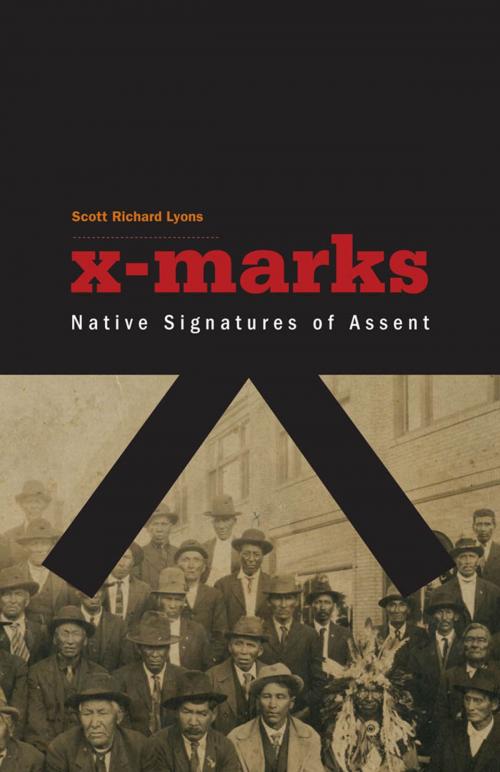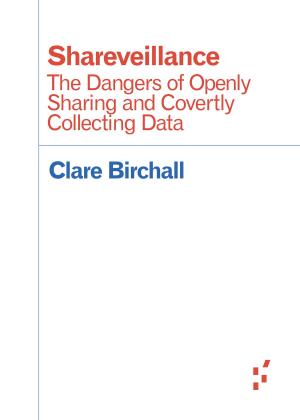X-Marks
Native Signatures of Assent
Nonfiction, Social & Cultural Studies, Social Science, Cultural Studies, Native American Studies| Author: | Scott Richard Lyons | ISBN: | 9781452915296 |
| Publisher: | University of Minnesota Press | Publication: | May 10, 2010 |
| Imprint: | Univ Of Minnesota Press | Language: | English |
| Author: | Scott Richard Lyons |
| ISBN: | 9781452915296 |
| Publisher: | University of Minnesota Press |
| Publication: | May 10, 2010 |
| Imprint: | Univ Of Minnesota Press |
| Language: | English |
During the eighteenth and nineteenth centuries, North American Indian leaders commonly signed treaties with the European powers and the American and Canadian governments with an X, signifying their presence and assent to the terms. These x-marks indicated coercion (because the treaties were made under unfair conditions), resistance (because they were often met with protest), and acquiescence (to both a European modernity and the end of a particular moment of Indian history and identity).
In X-Marks, Scott Richard Lyons explores the complexity of contemporary Indian identity and current debates among Indians about traditionalism, nationalism, and tribalism. Employing the x-mark as a metaphor for what he calls the “Indian assent to the new,” Lyons offers a valuable alternative to both imperialist concepts of assimilation and nativist notions of resistance, calling into question the binary oppositions produced during the age of imperialism and maintaining that indigeneity is something that people do, not what they are. Drawing on his personal experiences and family history on the Leech Lake Ojibwe Reservation in northern Minnesota, discourses embedded in Ojibwemowin (the Ojibwe language), and disagreements about Indian identity within Native American studies, Lyons contends that Indians should be able to choose nontraditional ways of living, thinking, and being without fear of being condemned as inauthentic.
Arguing for a greater recognition of the diversity of Native America, X-Marks analyzes ongoing controversies about Indian identity, addresses the issue of culture and its use and misuse by essentialists, and considers the implications of the idea of an Indian nation. At once intellectually rigorous and deeply personal, X-Marks holds that indigenous peoples can operate in modern times while simultaneously honoring and defending their communities, practices, and values.
During the eighteenth and nineteenth centuries, North American Indian leaders commonly signed treaties with the European powers and the American and Canadian governments with an X, signifying their presence and assent to the terms. These x-marks indicated coercion (because the treaties were made under unfair conditions), resistance (because they were often met with protest), and acquiescence (to both a European modernity and the end of a particular moment of Indian history and identity).
In X-Marks, Scott Richard Lyons explores the complexity of contemporary Indian identity and current debates among Indians about traditionalism, nationalism, and tribalism. Employing the x-mark as a metaphor for what he calls the “Indian assent to the new,” Lyons offers a valuable alternative to both imperialist concepts of assimilation and nativist notions of resistance, calling into question the binary oppositions produced during the age of imperialism and maintaining that indigeneity is something that people do, not what they are. Drawing on his personal experiences and family history on the Leech Lake Ojibwe Reservation in northern Minnesota, discourses embedded in Ojibwemowin (the Ojibwe language), and disagreements about Indian identity within Native American studies, Lyons contends that Indians should be able to choose nontraditional ways of living, thinking, and being without fear of being condemned as inauthentic.
Arguing for a greater recognition of the diversity of Native America, X-Marks analyzes ongoing controversies about Indian identity, addresses the issue of culture and its use and misuse by essentialists, and considers the implications of the idea of an Indian nation. At once intellectually rigorous and deeply personal, X-Marks holds that indigenous peoples can operate in modern times while simultaneously honoring and defending their communities, practices, and values.















